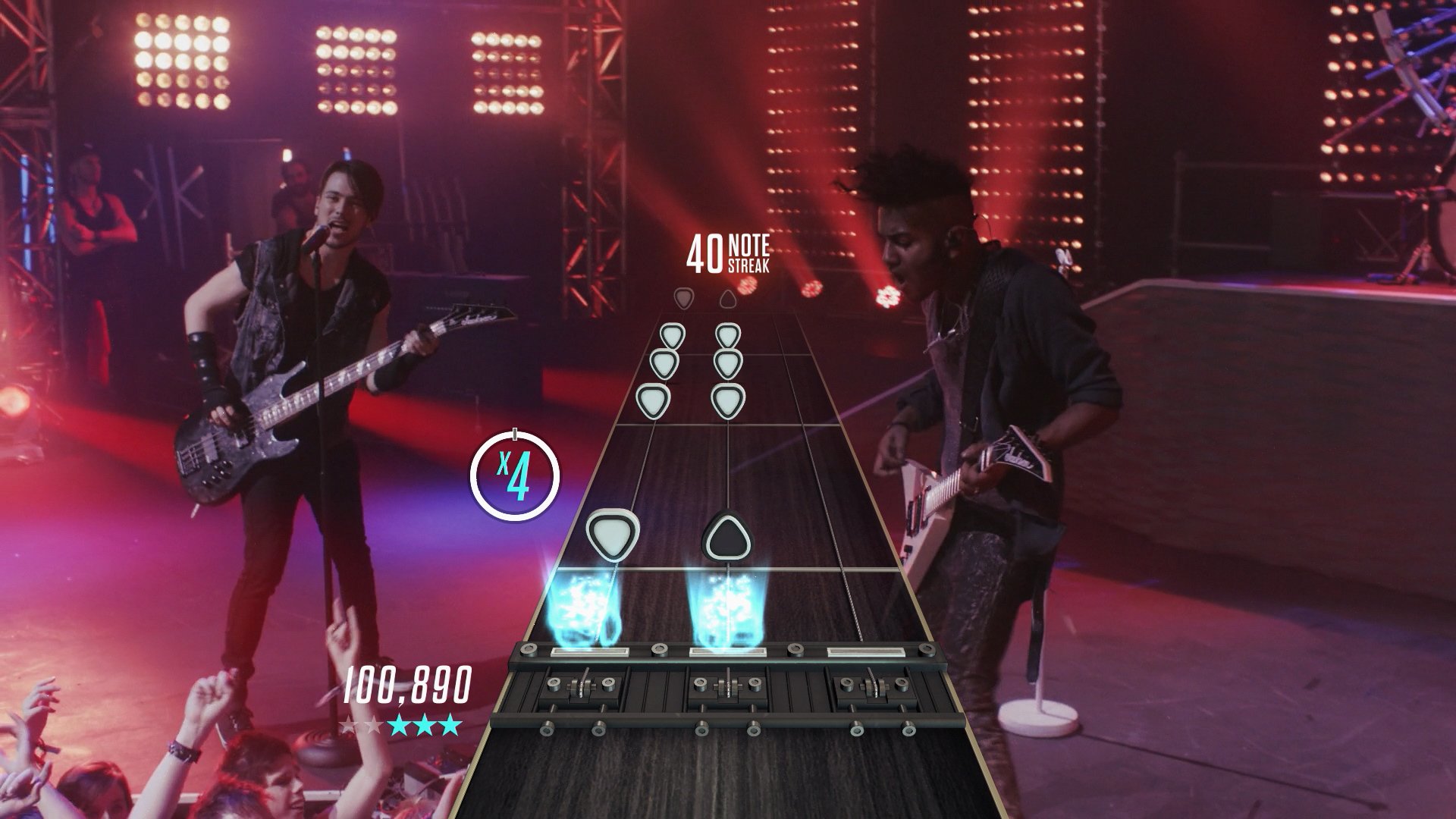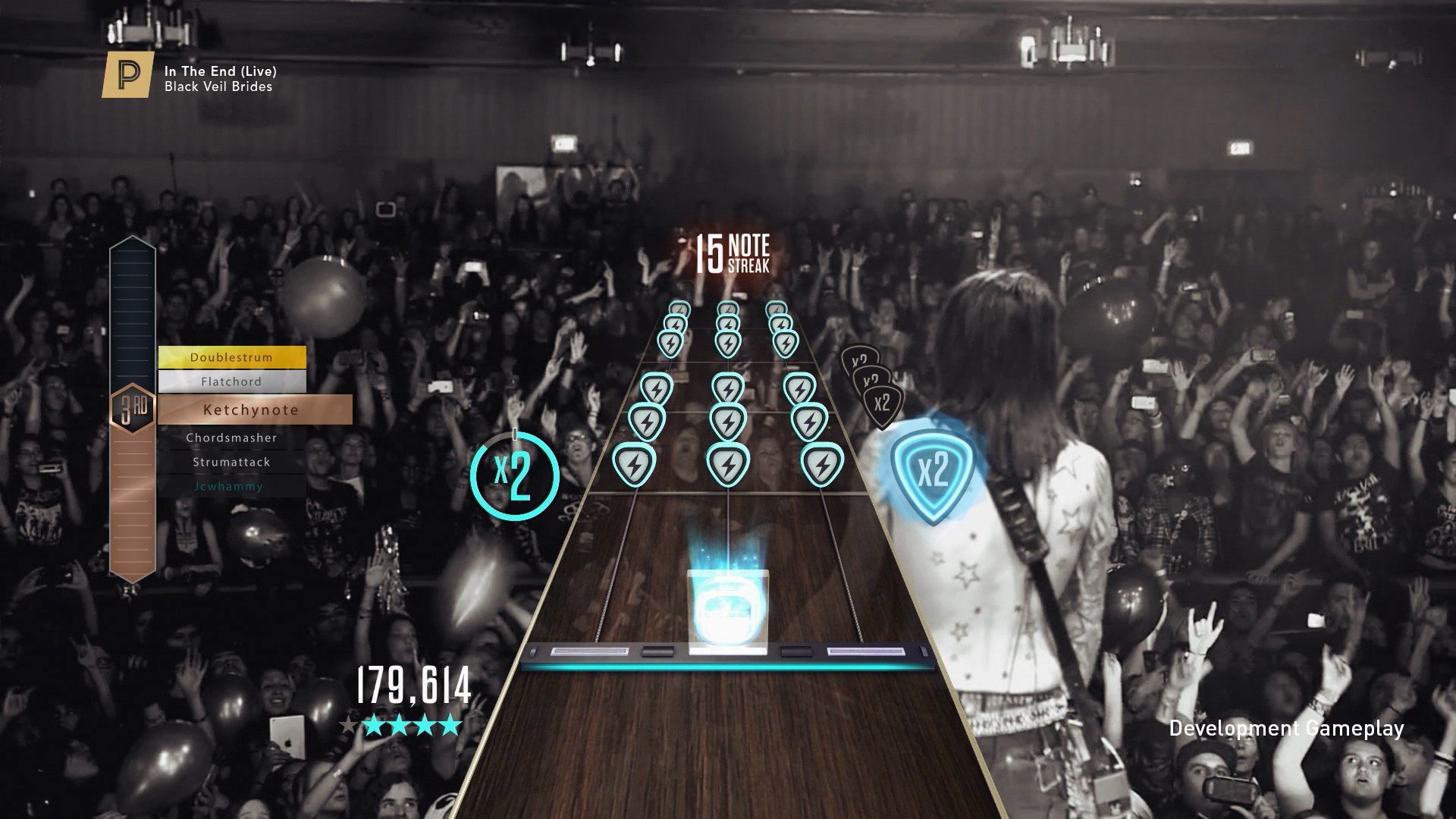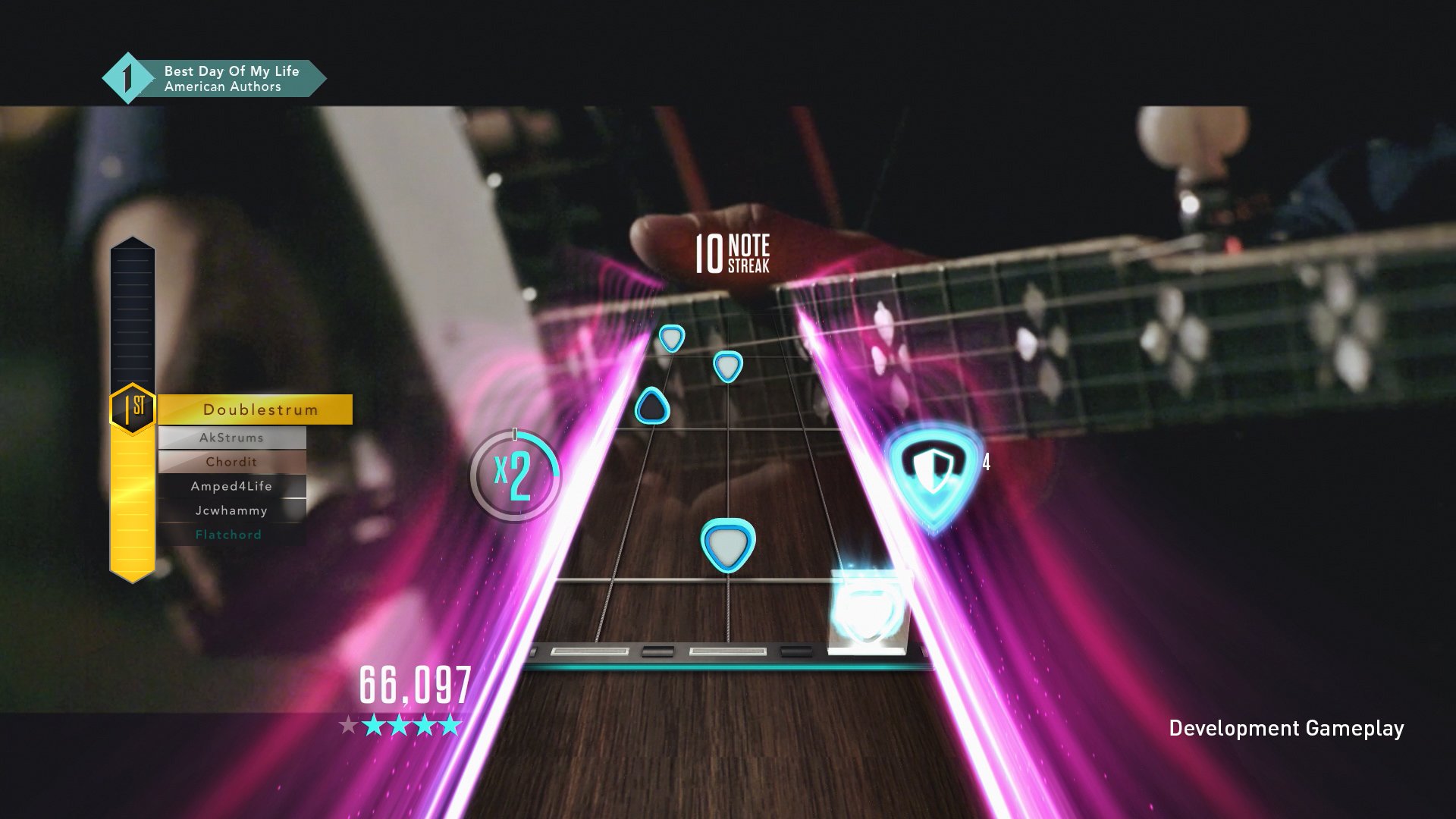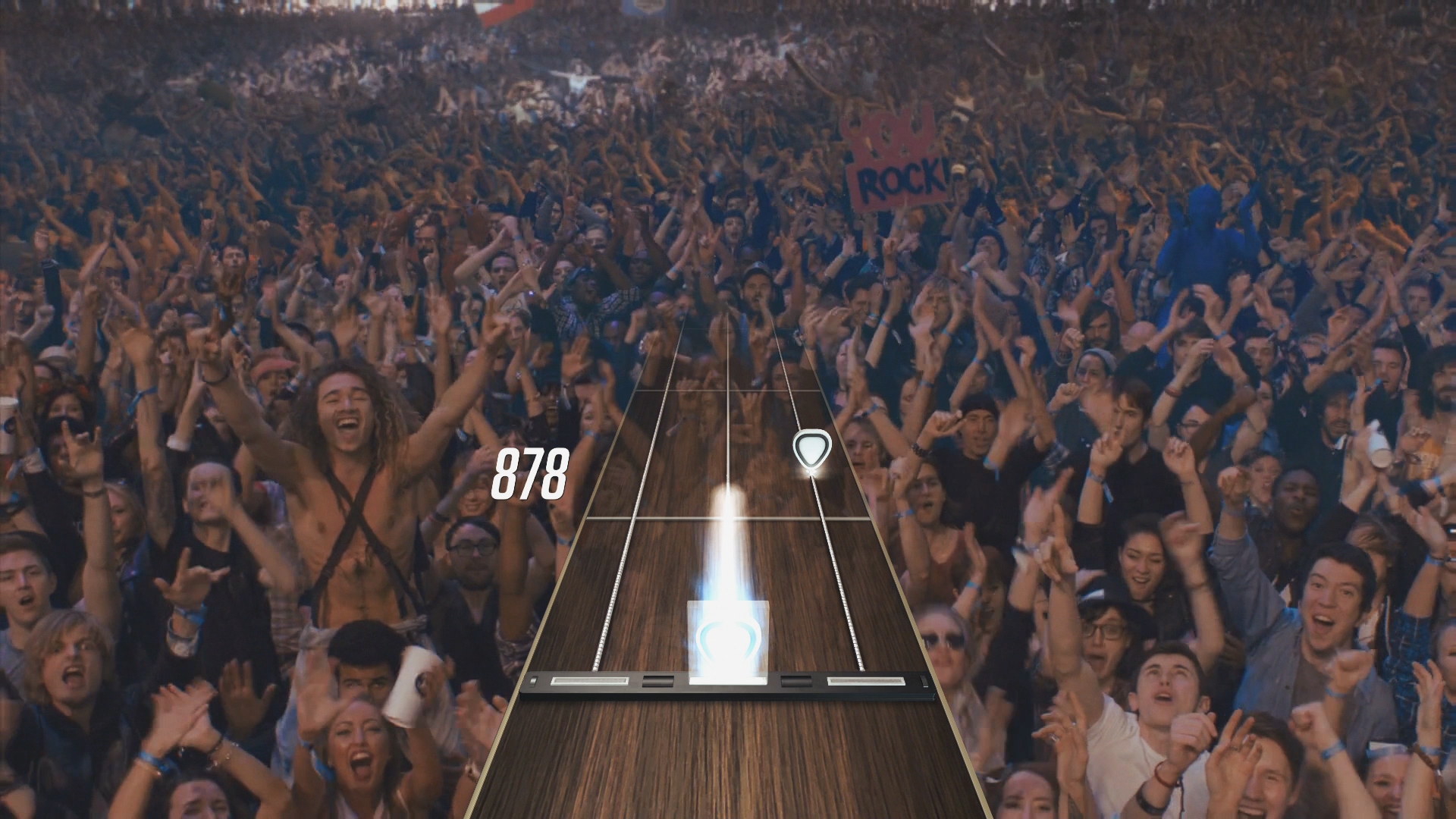Guitar Hero Live wants to be the music game for the Spotify generation
If you've been following along at home, you've probably heard that Guitar Hero Live aims to reboot the once-dominant music game franchise with a brand new plastic guitar and full-motion video that makes you feel like you're really rocking out in front of a crowd of thousands. That's all great, but the the part that interests me the most about Guitar Hero Live isn't the way it looks, or the new guitar, or even the songs on the disc. It's the way Guitar Hero is going to handle DLC going forward. That is, there's won't be DLC at all - at least not in the way we're used to.

That's not to say that the songs included with Guitar Hero Live at launch aren't worth playing. The set list is an eclectic mix of tunes both old and new, from Judas Priest's 'Breaking the Law' to The Killers' 'When You Were Young', but there's no doubt that the majority of tracks skew modern - most of the game's confirmed list was written within the last 15 years. Hell, there's a Skrillex song in here; a song which, I'm almost certain, doesn't actually have any guitar in it. It's clear that Activision is intending to cater to a younger audience than Rock Band, whose catalog spans thousands of songs over several decades, and that means providing those songs in a way that modern audiences now consume music.
Instead of being individual tracks available for purchase from a digital storefront, new songs will be added to Guitar Hero TV via live pre-programmed blocks of music videos, not unlike that of something like MTV (y'know, back when MTV actually played music). Guitar Hero TV requires an online connection, as it streams each of the songs to you via the internet. It also keeps track of leaderboards, your player level, and more, rewarding you with unlockable bonuses while you play. You don't own these songs - they exist entirely on Activision's servers, and you can play them by either tuning into the proper Guitar Hero TV 'channel' or by earning or purchasing tokens to play them on-demand.

It's a strange thing, not owning any of the songs - especially considering that I've purchased far more tracks for Rock Band than I care to admit (it's in the hundreds). But then again, that's how we interacted with music in 2008, when these games first debuted. The audience at the time was made up of people like me: musical obsessives who grew up in an era where you walked down to a store and purchased individual albums via vinyl, cassette, or compact disc, and then slowly but surely adopted digital ownership for its accessibility. The popularity of iTunes and other digital storefronts allowed for easy access to digital purchases of single songs, and it made sense for Guitar Hero and Rock Band to mimic that sense of music ownership by offering individual tracks at two bucks a pop.
But it's 2015 now. Spotify boasts 40 million active users, Apple rolled out its streaming music service to 11 million people, never mind the popularity of services like Pandora, Google Music, and YouTube. More and more people are willing to forgo ownership of music if it means that they can reliably gorge on a never-ending buffet of tunes. I personally have pared down a massive collection of CDs and records to just a handful of favorites, instead opting to pay Spotify less than $10 a month to have full access to nearly every song ever recorded in human history. Services like Spotify make listening to and sharing digital music easier, more accessible, and more affordable than ever - a complete 180 from the way the record industry has done business for years.

Guitar Hero Live is taking a similar direction with its 'DLC' plan so that it more closely resembles the likes of these streaming services. No, you won't 'own' any of the songs you play through Guitar Hero TV; instead, Guitar Hero TV gives you access to every single one of them, on-demand, as long as you have the tokens to play them. You'll even be able to pay flat rates to get timed access to the full library, similar to a karaoke room rental - a feature that these games have been sorely lacking since the beginning. And by taking the experience online, Guitar Hero can go beyond simply offering new tracks, and instead turn the act of music discovery into a living, constantly evolving experience by allowing players to try out new songs that they'd otherwise never hear - not unlike Spotify.
A lot has changed since the first years of the Xbox 360 and PlayStation 3. The people who bought Rock Band in 2008 are nearly ten years older - they have kids, spouses, and likely have less disposable income than they had when they were younger. I know I've invested thousands of dollars in Rock Band over the years, between DLC, instruments, and yearly disc-based updates, and I'm excited to pick up Rock Band 4 as a way to interact with all of those songs again. But I'm 30 years old now. I've got a fiancee and two kids. I can't spend money on Rock Band tunes like I used to, which means I'll be far more stingy about which downloadable tracks I end up picking up - if I pick up any at all. I can't be the only one who feels this way.
Weekly digests, tales from the communities you love, and more

So while Guitar Hero Live's initial set list may skew younger and more modern, I'm interested in trying it out solely for the fact that additional songs will be ready and waiting for me to play at regular intervals. It's exciting to get notifications from Spotify that the bands I like have new albums waiting for me to listen to, and since Guitar Hero Live's new tracks are simply added to the TV channels' line-ups for free, logging in will have that same sense of discovery. Guitar Hero Live might be a bit light on classic rock, 80's hits, or other genres at launch, but the constant online presence of Guitar Hero TV means that Activision can listen to feedback and make additions to the set list on the fly - all at virtually no cost to the consumer.
It'll be interesting to watch these two music game titans duke it out once again - but this time, both games represent completely different eras in music consumption. Rock Band 4 continues to represent the old guard, pushing forward its massive library to the new platform, each of its thousands of songs made available through individual purchases. Guitar Hero Live, then, represents an intriguing experiment in how we interact with additional content, and what we're willing to give up in ownership to receive in access. I can't wait to see how it plays out.



